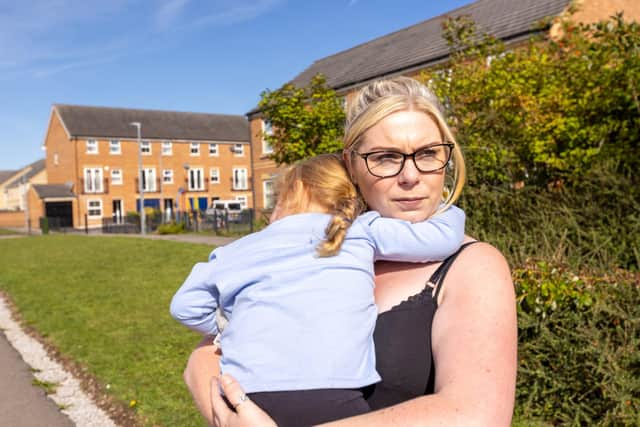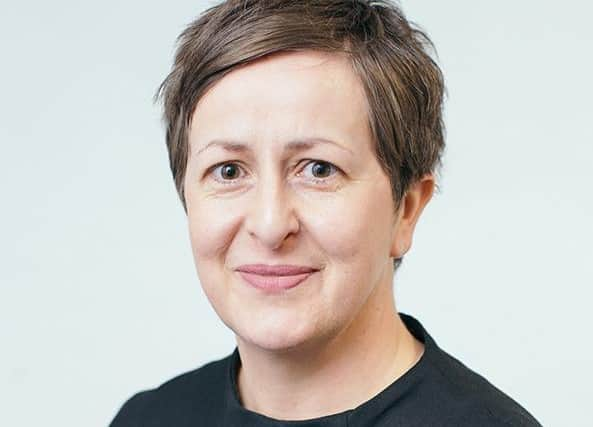Kinship care: Yorkshire families back campaign for greater support


It was April 2020, just weeks into the first Covid-19 lockdown when the couple, from Bradford, received the call. The eight-month-old’s mother was no longer able to care for her child. “We’d had a previous conversation about, if needed, whether me and my partner would be willing to take on [my niece] and we’d said yes,” Katie says. “But when we got the call, we most definitely weren’t expecting to go pick my niece up immediately.”
Katie’s niece is now one of the estimated 21,000 children living in kinship care in Yorkshire and the Humber. Kinship carers are relatives and close friends who care for 162,400 children in England and Wales, more than double the number of children in foster care. They keep children within families and out of the care system.
Advertisement
Hide AdAdvertisement
Hide AdKatie and Mark, who have asked to only be identified by their first names, started off as temporary kinship foster carers. In such arrangements, the child is considered ‘looked after’ by the local authority and the couple were able to receive a financial allowance from the council in the area where Katie’s niece had previously lived.
In November 2020, a ‘special guardianship’ arrangement was granted, meaning Katie, now 33, has a parental responsibility for her niece. But kinship carers do not receive the same support as foster carers.
A recent survey by the charity Kinship found eight in ten kinship carers were failing to receive crucial support, leaving many in crisis. Just over a third of those who responded to its annual survey, The Cost of Loving, say they now may be unable to continue to care for their loved ones.
The charity says the government’s “failure to put kinship carers on an equal footing to foster carers means support for kinship carers is a postcode lottery and cash-strapped local authorities are not providing the financial, practical and emotional support they need, increasing the risk that children will enter an over-stretched care system”.
Advertisement
Hide AdAdvertisement
Hide AdIt has launched its #ValueOurLove campaign, urging the government to provide immediate support for kinship carers and implement the recommendations from the Independent Review of Children’s Social Care.


The review’s final report earlier this year said: “Many kinship carers do not possess the means to get by and those that do often have to stop work or make life changing decisions about whether to use savings or cash in pension pots so that they can provide care. Some local authorities do provide support to kinship carers when they have sought legal permanence. However, this financial support is entirely discretionary and based on the relative priority local leaders give to kinship care. This leads to a postcode lottery of support.”
The report recommended that the government ensures all local authorities have support in place for kinship carers, including financial allowances, paid leave from employment, training and legal advice, and peer support.
Katie, who works in HR, has pledged her support to the Kinship campaign. “I’d like to see kinship carers formally recognised,” she says. “I think the biggest role they play is in the child’s identity. Keeping a child within the family means you’re able to retain that identity and family connection…I grew up in foster care, I was adopted when I was six and I know how important it was for me to understand where I came from.”
Advertisement
Hide AdAdvertisement
Hide AdKatie and Mark already had a good relationship with her niece, who would stay over at their house every other week. But adjusting to their new status was tough and her niece had a new home and a new routine at a time when the country was told to stay indoors during the first nationwide lockdown.
Katie says: “People say you had a choice, it was up to you whether you [took her on] or not, but what would you do if you got that call?”
“Your entire personal identity is put on hold,” she adds. “I’ve gone from being an auntie, which I absolutely adored, to not being an auntie anymore to this little girl, I’m her parent. I’m no longer Katie the individual, I’m now whatever it is my niece needs me to be for her.”
Katie describes how the circumstances have also affected her relationship with her sister. “I’ve gone from having a relationship with my sister to no relationship because my niece has had to take priority…It’s one of the hardest things I’ve had to go through. Me and my sister were together in care and we were each other’s constant…You’re almost going through a mourning process, mourning the loss of a relationship you no longer have.”
Advertisement
Hide AdAdvertisement
Hide AdKatie says the support of Kinship has been invaluable. But the charity’s survey paints a worrying picture. Almost half (45 per cent) of respondents said they had to give up jobs to care for their kinship children, leaving six in ten borrowing money, using short term loans and credit cards, and seven in ten spending their life savings and pension pots.
Forty per cent are now skipping meals, using food banks and buying less food and with a cost of living crisis, nearly six in ten say they will not put the heating on this winter, and 26 per cent say they won’t be able to pay bills.
Alison, 68, from North Yorkshire, is worried about what’s to come. She started caring for her two grandchildren, then aged three and six, when her daughter died following an asthma attack and cardiac arrest in 2012. She has an informal kinship care arrangement and receives no support from her local authority. She says: “I have to use my work pension to pay off my mortgage and use my state pension to pay for everything else.”
Alison was already caring for her mum when her daughter died. “Our world absolutely turned on its axis and our family structure changed,” she says. “A massive hole still remains in our family.”
Advertisement
Hide AdAdvertisement
Hide AdAlison currently looks after her grandchildren, now 13 and 17, during the week and most holidays, and at the weekends they stay with their dad. But she says kinship carers “can’t continue to support our young and vulnerable families on fresh air”.
She continues: “I am old school and naturally thrifty but watch every penny and find ways to make do, like using a school uniform exchange…We use food banks on a weekly basis and I have had to use credit cards.”
Alison’s energy bills have already doubled. She plans to keep the heating off for as long as possible and put hot water bottles in hers and the children’s beds. She says: “To be honest I have cried and cried because I don’t know how we are going to cope this winter. I am absolutely worried sick...It would make an ocean of difference if the government provided emotional and financial support to kinship carers and their children. So many of us are struggling just to keep a roof over our heads."
"I don’t want someone to pat me on the back and say well done,” she adds. “I need help, I need action and I need it now.”
Advertisement
Hide AdAdvertisement
Hide AdKinship CEO Dr Lucy Peake says kinship carers have been “overlooked and undervalued” for too long.“It’s outrageous that in today’s society many kinship families will be cold and hungry this winter because they don’t receive enough support to maintain their basic human rights. Kinship’s #ValueOurLove campaign is urging the government to give kinship carers the financial and emotional support they need and deserve.
“They make huge sacrifices to care for children - spending life savings, giving up jobs and moving homes, but they have been ignored and left without support because they are family. Unlike foster carers, being a kinship carer is not a choice, it is done through love and often in times of crisis. Kinship carers must be treated fairly because raising a child costs money.”
A Department for Education spokesperson said the government was working with organisations such as Kinship to understand the challenges that kinship carers face and “identify opportunities” to increase the support available to them.
“Kinship carers are a vital part of our society and play an important role in supporting a child’s development. Councils can offer discretionary financial support to kinship carers, and later this year, we will respond to recommendations set out in the Independent Review of Children’s Social Care, including on how to support kinship carers further. In recognition of rising costs, the government is also providing over £37 billion to help families, targeted to support the most vulnerable.”
